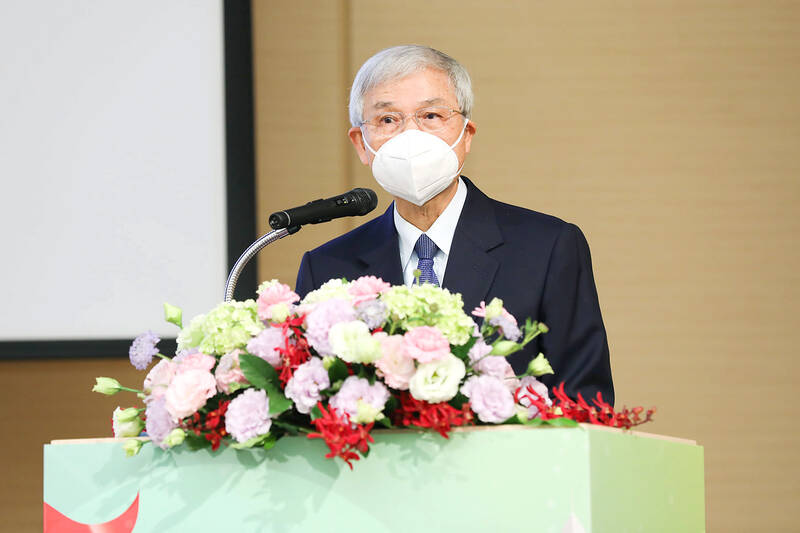The central bank yesterday raised its discount rate for the third time this year by 0.125 percentage points and hiked lenders’ required reserve ratio by 0.25 percentage points as it seeks to tame inflation, which remains above 2 percent.
The move came after it said it believed that consumer prices would this year increase 2.95 percent, while GDP growth would slow to 3.51 percent, compared with the 3.75 percent it projected three months earlier.
“The policy decision fell short of unanimous support this time as two board members favored adjustments of 0.25 percentage points to curb rent and house price hikes,” central bank Governor Yang Chin-long (楊金龍) told an online media briefing.

Photo courtesy of the central bank
Yang indicated that the central bank might halt tightening in December if consumer prices indicate a slowdown in inflation.
The consumer price index (CPI) growth would likely weaken to 1.88 percent next year with core CPI — excluding volatile energy and vegetable prices — at 1.87 percent, the central bank said.
Most research institutes are looking at lower CPI data next year, warranting a pause in monetary tightening, Yang said.
“It is too early to tell now in light of rising uncertainty,” he said. “The central bank will closely monitor economic changes in the coming three months.”
Interest rate hikes are not the best policy tool in battling imported inflation, Yang said.
The Cabinet has therefore cut tariffs on energy and raw materials imports, he added.
The US and Europe have no choice but to embark on drastic rate hikes to fight fast-growing inflation, whereas China and Japan continue monetary easing to support their economies, Yang said.
Taiwan should set a monetary policy that serves its own interest, Yang said, adding that the central bank favored draining excessive liquidity by raising required reserve ratios.
The hike of 0.25 percentage points in the reserve ratio would take up to NT$120 billion (US$3.8 billion) out of the market, Yang said.
The governor said the broad money supply measure of M2 should grow within the targeted range of 2.5 to 6.5 percent next year, from 7.66 percent in the first eight months of this year.
M2 refers to mutual funds, time deposits, time saving deposits, foreign currency deposits, cash and cash equivalents.
Yang rejected claims that Taiwan’s widening interest rate gap with the US has led to capital flight and local share corrections.
Poor TAIEX showings have much to do with US tech share declines, as many Taiwanese firms supply electronic components to US brands, he said.
The ongoing capital flight weighs on the local currency, which had shed 11 percent against the US dollar this year as of Tuesday, Yang said, calling the pace below his limit for market stability and orderliness.

US PUBLICATION: The results indicated a change in attitude after a 2023 survey showed 55 percent supported full-scale war to achieve unification, the report said More than half of Chinese were against the use of force to unify with Taiwan under any circumstances, a survey conducted by the Atlanta, Georgia-based Carter Center and Emory University found. The survey results, which were released on Wednesday in a report titled “Sovereignty, Security, & US-China Relations: Chinese Public Opinion,” showed that 55.1 percent of respondents agreed or somewhat agreed that “the Taiwan problem should not be resolved using force under any circumstances,” while 24.5 percent “strongly” or “somewhat” disagreed with the statement. The results indicated a change in attitude after a survey published in “Assessing Public Support for (Non)Peaceful Unification

The CIA has a message for Chinese government officials worried about their place in Chinese President Xi Jinping’s (習近平) government: Come work with us. The agency released two Mandarin-language videos on social media on Thursday inviting disgruntled officials to contact the CIA. The recruitment videos posted on YouTube and X racked up more than 5 million views combined in their first day. The outreach comes as CIA Director John Ratcliffe has vowed to boost the agency’s use of intelligence from human sources and its focus on China, which has recently targeted US officials with its own espionage operations. The videos are “aimed at

SHIFT: Taiwan’s better-than-expected first-quarter GDP and signs of weakness in the US have driven global capital back to emerging markets, the central bank head said The central bank yesterday blamed market speculation for the steep rise in the local currency, and urged exporters and financial institutions to stay calm and stop panic sell-offs to avoid hurting their own profitability. The nation’s top monetary policymaker said that it would step in, if necessary, to maintain order and stability in the foreign exchange market. The remarks came as the NT dollar yesterday closed up NT$0.919 to NT$30.145 against the US dollar in Taipei trading, after rising as high as NT$29.59 in intraday trading. The local currency has surged 5.85 percent against the greenback over the past two sessions, central

STEADFAST FRIEND: The bills encourage increased Taiwan-US engagement and address China’s distortion of UN Resolution 2758 to isolate Taiwan internationally The Presidential Office yesterday thanked the US House of Representatives for unanimously passing two Taiwan-related bills highlighting its solid support for Taiwan’s democracy and global participation, and for deepening bilateral relations. One of the bills, the Taiwan Assurance Implementation Act, requires the US Department of State to periodically review its guidelines for engagement with Taiwan, and report to the US Congress on the guidelines and plans to lift self-imposed limitations on US-Taiwan engagement. The other bill is the Taiwan International Solidarity Act, which clarifies that UN Resolution 2758 does not address the issue of the representation of Taiwan or its people in